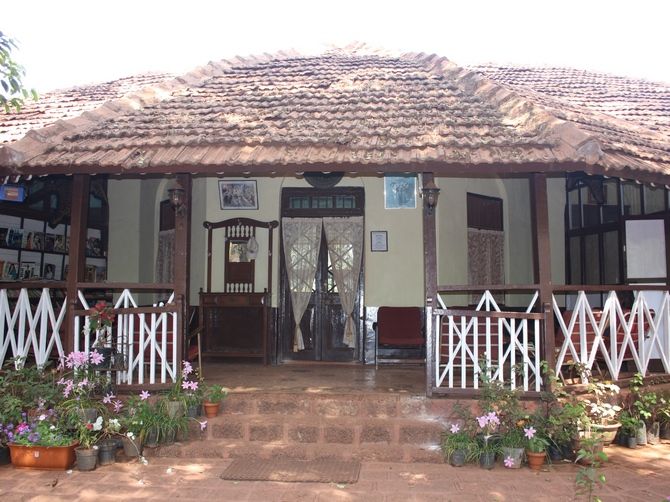 | « Back to article | Print this article |
Geetanjali Krishna unwinds in Matheran in an ambience that seems frozen in time.
 Long weekends invariably drive city dwellers to take a quick break from their urban confines, and I'm no exception.
Long weekends invariably drive city dwellers to take a quick break from their urban confines, and I'm no exception.
But when I find myself heading to Matheran for the weekend during a week-long trip to Mumbai, the pleasure of a stolen break is somehow intensified.
Excited about seeing the Sahyadri range up close, we kit ourselves out in our oldest shoes ("The red soil of Matheran will never wash off your good shoes," cautions my brother) and set off at first light to avoid the torturous traffic on the Mumbai-Pune highway.
Around 90 km from Mumbai, Matheran has the unique distinction of being Asia's only pedestrian hill resort.
As we inch forward through the continuous klaxon of horns on the highway, it seems like a very pleasant prospect indeed.
The nearest railhead is Neral in the plains, and slightly higher up, one can park next to the railway station at Dasturi, from where a slow toy train or a skittish horse or, if your tastes run that way, a palanquin, can take you up to Matheran.
Not partial to any of these, I decide to walk up, quite sure that I would make it in about the same time as the train.
It's a pleasant 45-minute walk through dense forest to Matheran, past the once-grand mansions of the British, Parsis and Bohras.
Although there is a proper path, I decide to follow the railway tracks to avoid the horses and their inevitable droppings.
Soon, I see the old train chugging downhill asthmatically, seemingly sepia-tinted by the red laterite mud that rises up in the air.
The train is actually as old as it looks -- the Matheran Hill Railway was built in 1907 by the Bohra philanthropist, Sir Adamjee Peerbhoy, to allow common people access to the hill station.
Sadly, the toy train failed to make it to the UNESCO list -- maybe a light-hearted history of summer romance and picnics in the mist lacked the gravitas of a UNESCO World Heritage Site.
Reaching the top of the table-like mountain on which the tiny hill station is perched is almost anti-climactic.
The main market faces the railway station, with touristy shops selling Chinese souvenirs, fudge (Matheran is mystifyingly famous for this sticky, sickly sweet sweet) and more.
As I jump into a dusty, thorny hedge to avoid the copious spray from a urinating horse, I realise that they're as much of a menace to pedestrians as cars are.
By the time my brother and his wife arrive on the train, their toddler hanging out excitedly from the window, I've had a cup of masala tea and vada pao at a roadside cafe, admiring the horses from a safe distance.
They're all rather tall and well groomed, as are the horsemen.
As I look at their glossy manes (the horses and the horsemen both have them), the chatty waiter tells me that many of them are aspiring film actors, hoping to get noticed.
I ask the waiter what he recommends we do during our stay in Matheran.

"There's little to do here other than walk through the forest to different look-out points..." he says.
Apparently, the town has as many as 38 designated look-out points from where one can see different aspects of the Sahyadris.
Our hotel, the delightful Neemrana property, Verandah in the Forest, is thankfully far from the madding crowds, a pleasant walk on a red-tinged trail.
It was the second house to be built on the Western Ghats by Captain Barr in the 19th century, and its deep, cool verandah with old-fashioned armchairs is a wonderful spot in which to unwind.
Later, I walk in its pleasantly overgrown gardens, spotting a frustratingly large number of birds and butterflies I'm unable to identify.
Protected as an eco-sensitive region, Matheran has a lot to offer to walkers.

We trudge to Charlotte Lake with a picnic tea, its blue waters flanked by a glorious array of trees.
The stillness is absolute, enhanced by the absence of traffic noise.
Even our usual exercise of making stones skip on water seems too noisy for the setting.
The next morning, our shoes covered with red dust, we decide to see as many "points" as we can, and end up walking to Louisa Point, Echo Point and Monkey Point, all of which offer lovely silent vistas of the Western Ghats. The monkeys, however, make our walking tough.
They snatch bags, sunglasses... even the lollipop from my nephew's hands.
"There's little we can do," says a mounted policeman who is witness to our plight.
"Nowhere in the county has anyone come up with a plan to truly curb their menace, so why would Matheran be an exception?
Our last meal in Matheran is at Lords, the iconic Parsi restaurant and hotel, ramshackle in the way beloved clubs are.

The sense of having stepped back into sepia-tinted time grows stronger as we enter the dining room with geriatric diners and furniture of matching vintage.
A good but heavy Parsi meal later, we're all set to walk down to Dasturi Naka to pick up our car and drive back to horns, exhaust fumes and jams.
We take our last lungful of good clean air before we leave and I muse that memories of Matheran will haunt me till I return to this quaint pedestrian town, so perfect for an ambler like me.
Photographs: Rajesh Karkera/Rediff.com